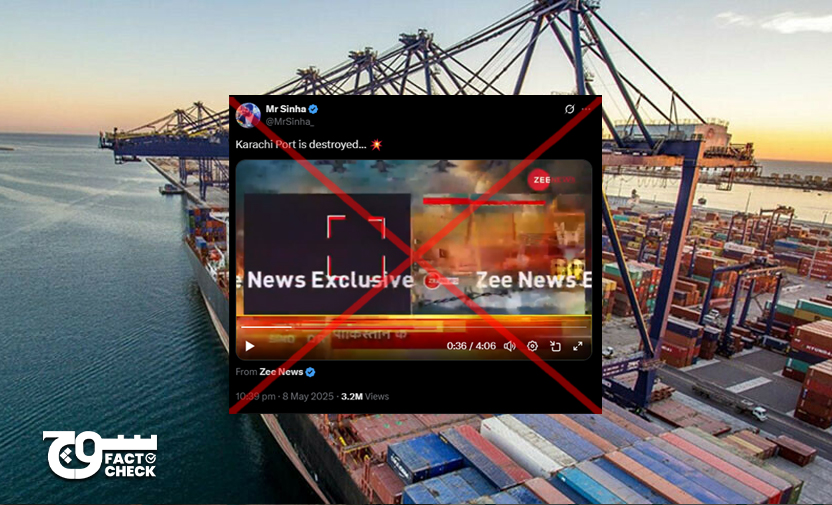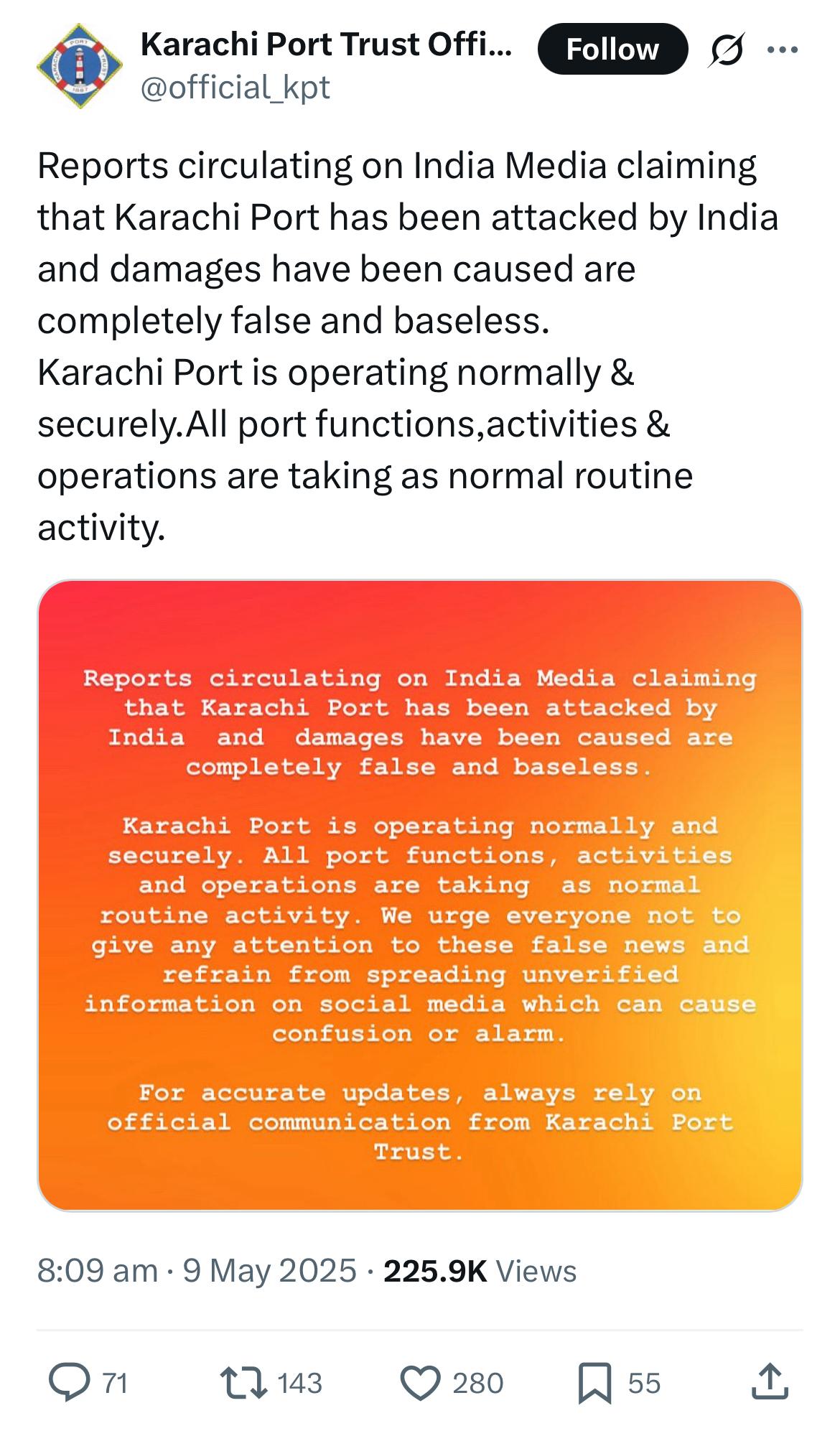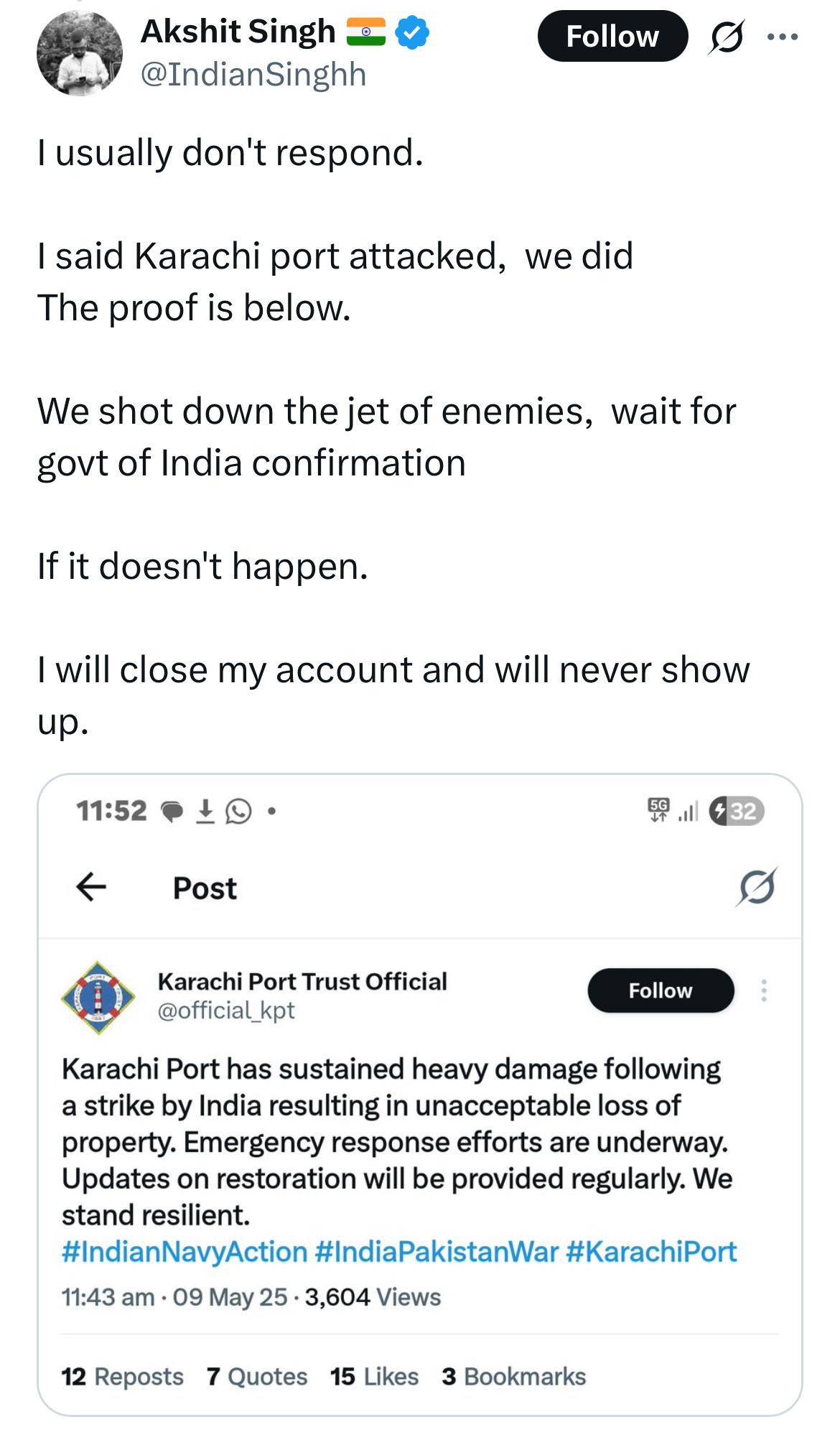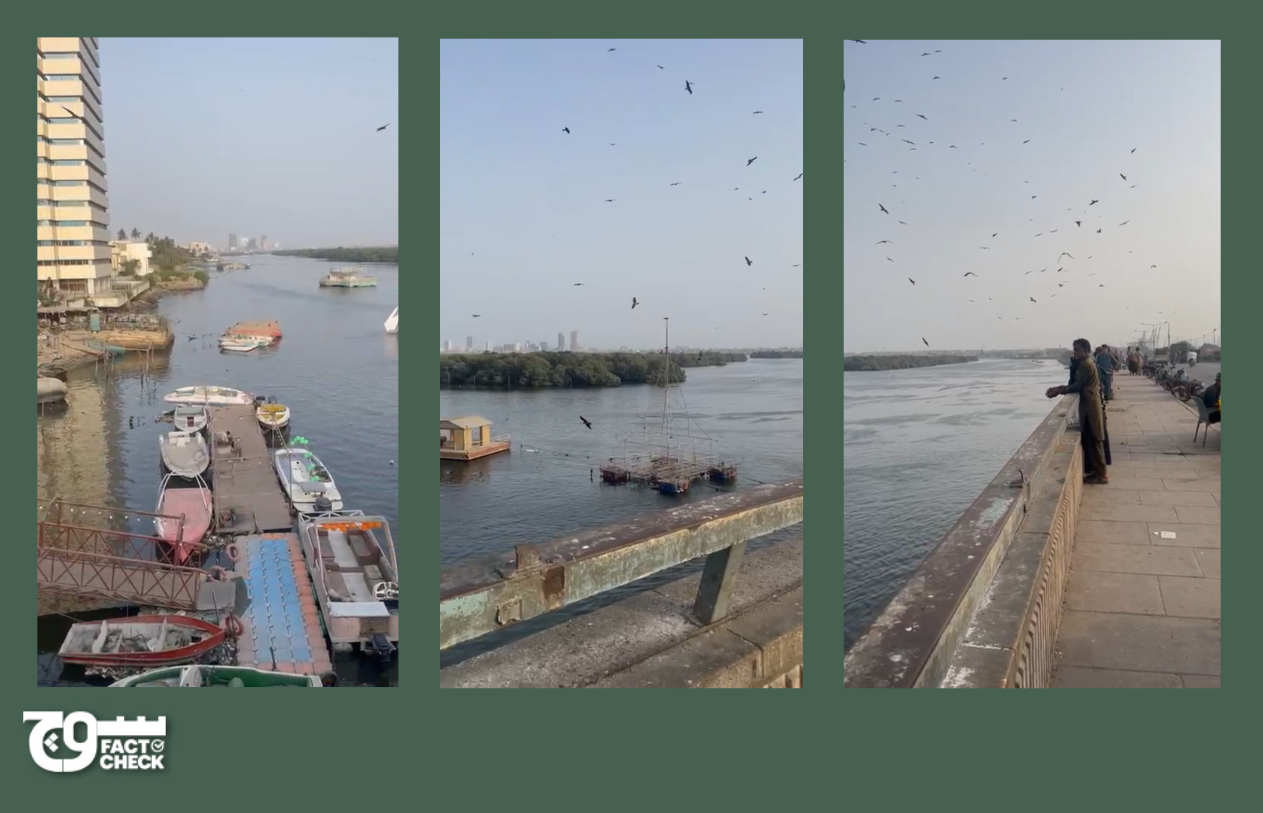
Claim: India attacked Karachi Port on 8 May. Following the attack, the Karachi Port Trust (KPT) authorities admitted suffering major losses.
Fact: Karachi Port was not attacked by India, and the KPT’s post on X claiming as such is false. The X post came after KPT’s official account was hacked briefly on the morning of 9 May 2025, but the account was recovered and the post was deleted soon after — Karachi Port Trust’s official spokesperson confirmed to Soch Fact Check.
In the late hours of 8 May, several Indian media outlets began claiming that India had attacked Karachi Port.
The claim quickly spread across social media platforms.
For instance, X user @MrSinha_ shared a clip (archive) from the Indian news channel Zee News, captioned: “Karachi Port is destroyed… 💥”
Subsequently, on 9 May, several Indian news outlets shared posts from KPT’s official X account claiming that the port’s authorities had admitted to suffering huge losses following Indian strikes.
Fact or Fiction?
Soch Fact Check initially reviewed the official X account of the Karachi Port Trust (KPT). At 8:09 AM on 9 May, KPT issued a statement via X that read: “Reports circulating in Indian media claiming that Karachi Port has been attacked by India and that damages have been caused are completely false and baseless. Karachi Port is operating normally and securely. All port functions, activities, and operations are continuing as part of the normal routine.”

However, at 11:43 AM, a post appeared on the same account, which acknowledged losses after an Indian strike. The post was subsequently picked up by Indian media outlets and shared by Indian social media users.

At 12:10 PM, a new post on the account read: “The account was hacked ! Karachi Port is safe and secure !”
To clarify the situation further, Soch Fact Check contacted KPT spokesperson Shariq Amin, who confirmed that the X account had been hacked around 11:13 AM. He told us, “India also published fake news through the hacked account. After we recovered access, we deleted those messages.”
He further added that the KPT has issued a press release stating that the attack and the claims made are fake. The social media account was hacked, the false content has been removed, and the account has now been recovered.”
Amin also confirmed that there was no attack on the port, nor any unusual activity. KPT operational staff reaffirmed this, and told Soch Fact Check that no such incident had occurred.
A team member from our sister company Soch Videos visited the Karachi Port along with other team members and shared stills confirming that operations at the port were continuing as normal.

Operation Sindoor and Pakistan’s Response
Indian airstrikes in Pakistan
In the early hours of 7 May, the Indian military launched Operation Sindoor and sent missiles at least six targets inside Pakistan and Pakistan-administered Kashmir. These missile strikes, which constituted the most serious escalation of military hostilities between the two nations since 1971, killed at least 31 people, including at least three children, and wounded at least 57 others according to Pakistani authorities.
India claimed that their missiles struck nine “terrorist camps” whereas Pakistan asserted that the targets chosen by India were civilian neighborhoods in densely populated areas. While it is difficult to independently ascertain whether “terrorist camps” were the target of India’s strikes, on ground footage and reporting from local hospitals showed that a number of women and children had been killed and injured in the attacks. This lends credibility to Pakistan’s assertions that civilians were harmed, contrary to claims made by Indian officials.
Notably, military strikes in Pakistani Punjab are across a recognised international border and constitute a major escalation relative to the surgical strikes carried out along the Line of Control (LoC), the ceasefire line that divides Pakistan-administered Kashmir from Indian-administered Kashmir. Pakistan’s Prime Minister Shehbaz Sharif condemned the airstrikes, saying his country had “every right to give a robust response to this act of war imposed by India”.
The Pahalgam Attack
The strikes carried out by India as part of Operation Sindoor were purportedly in response to the terror attack that took place in Pehelgam in Indian-administered Kashmir on 22 April 2025, which killed 26 people, mostly tourists.
India has blamed the attacks on Pakistan whereas Pakistan has denied any involvement and demanded a neutral investigation.
The Resistance Front – a group that Indian officials maintain is a proxy front for the Pakistan-based militant group Lashkar-e-Taiba (LeT) – initially claimed responsibility for that attack but later retracted its statement.
The Indus Waters Treaty
Soon after the attack in Pahalgam, the Indian government announced the suspension of the Indus Waters Treaty. The landmark water-sharing treaty, which had been in place since 1960 had previously endured despite many instances of armed conflict between the neighbouring nuclear countries.
After a UNSC meeting to discuss the matter, Indian Prime Minister Narendra Modi said, “Now, India’s water will flow for India’s benefit, it will be conserved for India’s benefit, and it will be used for India’s progress”. On the other hand, Pakistan stated that attempts to stop or divert Pakistan’s water would be considered an “act of war and responded with full force across the complete spectrum of national power”.
Indian Jets in Pakistan
Soon after Indian missile strikes hit multiple locations in Pakistan, the Pakistani military announced that they had shot down five Indian warplanes including several Rafale Fifth Generation fighter jets. India has not yet responded directly to this claim but a growing number of media outlets have confirmed that at least some Indians planes, including at least one Rafale, did in fact go down during the early morning hours of 7 May 2025.
Drone War
On the morning of 8 May, India launched a wave of drone attacks across Pakistan, killing at least one person and wounding several. Pakistan military spokesperson claimed that 25 Indian drones were shot down in different locations across the country and on the following day claimed that the number of drones shot down had grown to 77.
At this time, Soch Fact Check has not been able to independently verify the exact number of Indian drones that entered Pakistan, or how many were shot down. Debris from drones has been found in a number of locations and Soch Fact Check has visited the two crash sites in Karachi and two in Rawalpindi.
Indian authorities claimed that the drone attacks were in response to a Pakistani attack on Amritsar the previous night whereas Pakistan denied that any attacks had been carried out. Subsequent to the drone attacks on Pakistan, India said that Pakistan carried out missile and drone attacks on Jammu in Indian Occupied Kashmir. Pakistan also denied this allegation, adding that it was “entirely unfounded, politically motivated, and part of a reckless propaganda campaign aimed at maligning Pakistan”.
A surge of unverified claims and disinformation has circulated on social media since the Pahalgam terror attack, and it has spiked sharply after India launched missile strikes into Pakistani territory early Wednesday morning.
Update: At 8:40 PM, KPT spokesperson Shariq Amin shared footage of the port from the evening of 9 May 2025.
Virality
The claim was shared here, here, here, here, and here on X. Archived here, here, here, here, and here.
On Facebook, it was shared here, here, here, here, and here. Archived here, here, here, here, and here.
Conclusion: The claim is false. Karachi Port was not attacked by India.
–
Background image in cover photo: Karachi Port Trust
To appeal against our fact-check, please send an email to appeals@sochfactcheck.com
